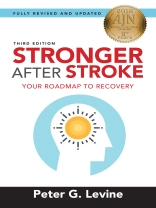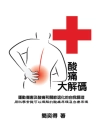Now in its third edition, Stronger After Stroke puts the power of recovery in the reader’s hands by providing simple-to-follow instructions for reaching the highest possible level of recovery. The book’s neuroplastic recovery model stresses repetition of task-specific practice, proper scheduling of practice, setting goals, and measuring progress to achieve optimal results. Researcher Peter G Levine breaks down the science and gives survivors evidence-based tools to retrain the brain and take charge of recovery.
In easy-to-read sections, Stronger After Stroke introduces readers to leading-edge stroke recovery information while simplifying the process to attain specific benchmarks. Also included is a sample recovery schedule, a helpful glossary of frequently used stroke recovery terms, and a list of resources for readers to research emerging stroke recovery options.
The new Third Edition of Stronger After Stroke features:
- Complete update of all chapters to reflect new knowledge about maximizing recovery
- The latest research insights applied to individual recovery programs
- Steps to cope with challenges at each stage of recovery and achieve success
- DIY strategies to save time and money
- New chapters on using electrical stimulation, reducing post-stroke pain, and understanding spasticity
विषयसूची
Foreword Michelle Ploughman, Ph D, MSc, BSc PT
Preface
Introduction
Acknowledgments
1. Stroke Recovery Essentials
Plan Your Work and Work Your Plan
Say No to Plateau
Use Your Fantastic Plastic Brain
A Doctor Made for Stroke Survivors
Neuroscience: Your New Best Friend
Using the Wisdom of Athletes
The Ultimate Stroke Recovery Drug
Measuring Progress
2. Recovery Hints and Tricks
Challenge Equals Recovery
Use What You Have
Train Well on a Treadmill
Mirrors Reflect Recovery
The Mind, the Brain, and Sticking to the Task
Let Recovery Flow
The Recovery Calendar
Roadmap to Recovery
Tips for the Caregiver
3. Safeguarding the Recovery Investment
Reduce Pain to Increase Recovery
Stay Off the Killing Floor
Reduce the Risk of Another Stroke
Protect Your Bones
Don’t Shorten
Shoulder Care 101
Five Tests You Should Do
4. Cool Treatment Options
Constraint-Induced Therapy for the Arm and Hand
Get Your Hand Back
Imagine It!
Electrical Stimulation for Frugal Dummies
Stimulate Your Stride
Mirror Therapy (MT)
Recovery of Feeling
Speak Musically
Constraint-Induced Therapy for Speech
You Are Game—Virtual Reality
The Good Trains the Bad—Bilateral Training
Rhythm Rehab for the Arms and Hands
Walking in Rhythm
Shocking Subluxation
The Neuroplastic Model for “Pusher” Syndrome
5. Elements of Exercise Essential to Recovery
Horizontal Rehab: Good Sleep = Good Recovery
Get a Home Exercise Program
Space to Recover—The Home Gym
Space to Focus—The Community Gym
Weight Up!
Bank Energy and Watch Your Investment Grow
6. Recovery Strategies
The 4 Phases of Stroke Recovery—And What to Do During Each
The Subacute Phase: Recovery’s Sweet Spot
Expanding the Therapeutic Footprint
Therapy Soup—Mix and Match
Lifestyle as Therapy
Your Work Schedule
Living Recovery
Keep the Core Values Close
Hard but Safe
Eat to Recover
Make Home Movies
Don’t Neglect the “Good” Side
Guide Your Doctor
7. Spasticity Control and Elimination
Spasticity—The Beast Unmasked
Neuroplastic Beats Spastic
Spasticity, Tone, and Contracture: Even Clinicians Get it Wrong
Spasticity—Jekyll and Hyde?
Give Spasticity the One–Two Punch
8. Motivation: Recovery Fuel
Meeting the Challenge of Recovery
Be a Caveman
When Help Hurts
Reconsider Medications
Fight Fatigue
Walking Your Way to Better Walking
The Young Adult Stroke Survivor (YASS): Driven to Recover
9. Recovery Machines
Those Amazing Machines
Resources
Glossary
Index
About the Author
लेखक के बारे में
Peter G Levine is a researcher, author, clinician, and instructor. Pete was a Research Associate at both the Department of PM&R University of Cincinnati College of Medicine and the Kessler Institute for Rehabilitation, and a consultant at the B.R.A.I.N. Laboratory, located in The Ohio State University Medical Center.












